hairball support
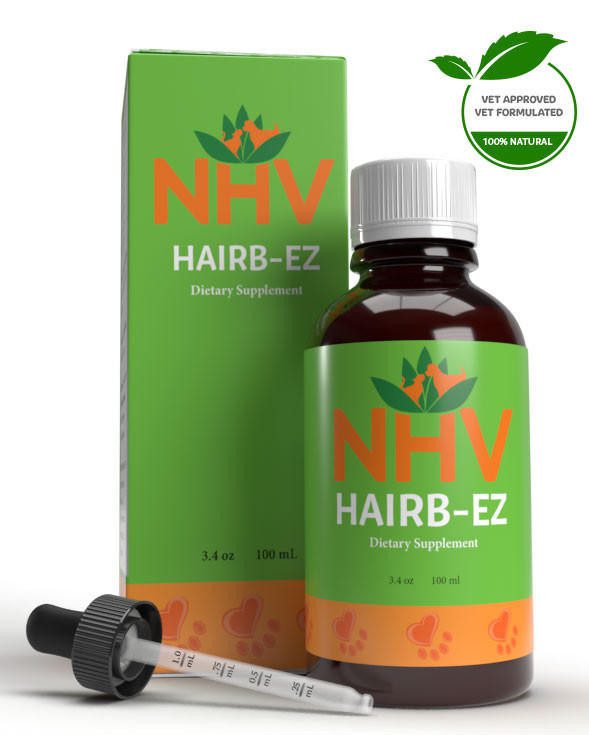
free shipping over $100 (USA & Canada)
1-877-937-4372 the pet expert hotline
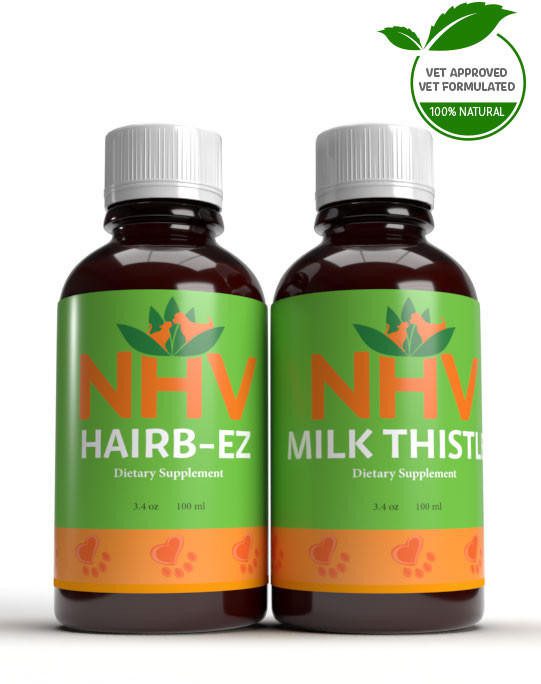
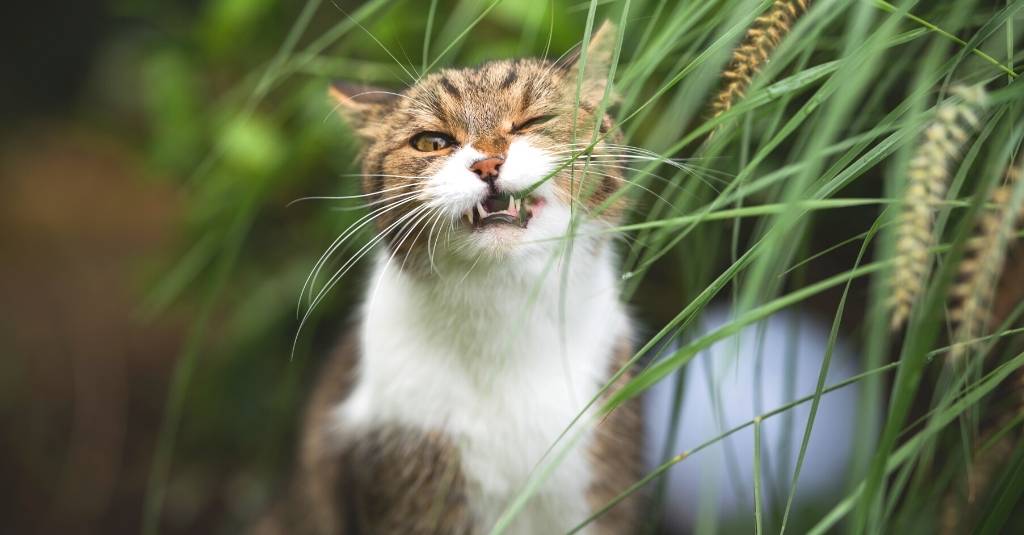
Ever looked out the window to see your cat or dog helping out with the landscaping duties by eating the grass? Do they get sick afterward? It may seem strange to see, but don’t panic just yet. There are many reasons why our pets eat grass, and many of them are natural and common.
Let’s separate cats and dogs to take a closer look:
The reason is not completely understood; however, it has been observed in domestic and wild cats and many experts believe that eating grass can be beneficial and is likely a natural instinct. Sound crazy? Think about this: If an outdoor cat catches prey, they consume the entire thing – edible parts as well as inedible parts like feathers, bones, fur, etc. This can be challenging for the digestive system. Now, add grass and they have some help. How, you say? Cats do not have the enzymes necessary to break down this plant matter, so consuming such in its whole and natural form can cause them to throw up (note: not all cats throw up after eating grass). By doing so, the cat can clear its stomach of fur, feathers, bones, parasites (like worms), and its own furballs, which can be irritating to the digestive tract. It’s similar to owls, but unfortunately not in quite as tidy of a bundle.
So, what if your cat doesn’t throw up? It’s ok. Some experts believe that grass can also act as a natural laxative. Maybe it’s intuition that cats know that when they have a hairball or other indigestible material that makes its way deeper into the digestive tract, eating a little bit of grass can help smooth the move.
The juices in grass contain folic acid and other micronutrients, which are essential for a cat’s bodily functions.
Another theory is that cats will eat grass for nutritional purposes. The juices in grass contain folic acid and other micronutrients, which are essential for a cat’s bodily functions. Going back to cats that eat prey for a moment. As previously discussed, when cats eat prey, they often eat the entire thing. This includes the stomach (and stomach contents). Since the majority of prey would consume plant material, the cats would also ingest this plant matter, absorbing the nutrients it provides. Now, most of us feed our cats well, giving them no reason to hunt for food, so they might not be getting those nutritional remnants. Their bodies may be telling them that they are lacking nutrients causing the craving to munch on some greens.
Some cats might also eat grass just because they can. Maybe they simply like the taste. We have heard of many cats, including our own, that do not hesitate to devour foods in the fruit and veggie category, like apples, celery, carrots, and peas.
Eating grass is quite common in both domestic and wild species of dogs, and just like cats, maybe completely natural. There is still some debate as to whether dogs are omnivores or carnivores, however, it is agreed that they are more of an opportunistic scavenger than carnivorous cats, and can survive on whatever is available, including omnivorous diets. Wild dogs often eat a good portion of fruits and plants, giving them a wider array of nutrition, and our domesticated versions may still have this innate nutritional craving.
Grass eating in dogs doesn’t usually lead to throwing up, but gulping it down in large bites instead of being chewed can. Experts believe that the grass tickles the throat and stomach lining causing the reaction to throw up. Some studies show that less than 10% of dogs seem sick before eating it but may do so to induce vomiting when they feel unwell or gassy. So why else would they eat grass?
Just like cats, one theory is that they eat grass for nutritional support. Not only does it contain important nutrients, but it also provides fiber, which can be helpful with digestion. Some dogs that regularly eat grass are simply not getting enough fiber in their diet.
So, you feed your dog a balanced and nutritious diet, why are they still eating grass? Another reason that dogs eat grass, especially puppies, is because they are bored. A much better alternative to our human boredom snacks, *cough, potato chips*, but not ideal. If you find that your pup is acting more like a cow in a field, you might need to increase their exercise and playtime to reduce boredom. Maybe consider buying them a new toy that they can play with independently if time is not on your side.
Also, like cats (so many similarities for such different animals!), dogs might just like the taste of it.
Ok, that was a lot of info – What’s the gist of it? Eating grass is normal, but a sudden increase in grass consumption could be a sign of intestinal distress and should be monitored. For dogs, this could also signal boredom or a nutritional/fiber deficiency in their food and you may want to consider switching to better food.
What can you do to help? Grass grown outdoors may very well have been sprayed with chemicals and fertilizers, so to ensure your pet is eating the best option, you can grow your own. Try growing a little pot that they can easily reach, either inside your house or on the patio (multifunctional – also adds to décor!). Some great options are: Wheatgrass, Barley, Orchard Grass, and Common oat. You don’t need a green thumb – they are easy to grow and just need a bright spot and regular watering. Also, make sure that household and garden plants are a non-toxic variety as your pet may not discriminate as to the foliage they eat!
If you feel that your cat is eating grass to help with hairballs, try adding some NHV Hairb-Ez to their daily regime. It helps dissolve ingested hairballs, eliminating the need for vomiting and reducing constipation and discomfort.
If constipation is the issue, NHV Maris works quickly to help relieve constipation, promoting soft stools and gastrointestinal health.
If you feel that your dog is chomping on more grass due to a nutrient deficiency, add NHV Multi Essentials to their diet to help fill nutritional gaps. You can also try adding some cooked veggies that are high in fiber to their regular food.
Have unanswered questions about your pet’s grass-eating habit? One of our Pet Experts will happily help you!
hairball support

Cat Hairball Remedy
buy 2 and save $3
3 month supply for a small to medium size pet.
Hairb-Ez is a natural cat hairball remedy that helps your cat to pass indigestible hair from its system and reduces regurgitated hair. It also

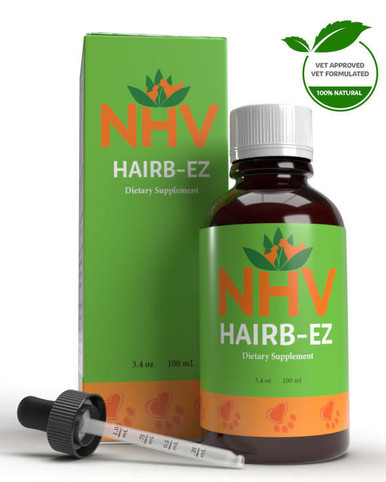
Hairb-Ez is a natural cat hairball remedy that helps your cat to pass indigestible hair from its system and reduces regurgitated hair. It also

Help eliminate nasty hairballs and resulting constipation with Hairb-Ez, an all-natural herbal cat hairball remedy that helps unblock loose hair and keep it from forming into balls that become lodged in your cat’s stomach. Hairballs result from frequent grooming with the tongue and are common in long and medium-haired cats.
Hairb-Ez helps to dissolve ingested hairballs. It contains a gentle laxative herb as well as herbs that help relieve discomfort and bloating. Read how NHV Hairb-Ez helped Tatiana the kitty who had terrible bouts of hairballs until NHV Hairb-Ez.
This formula can also be used for dogs who may get hairballs, though this is a much rarer condition in dogs, and underlying causes should be looked at by your vet. For more tips on hairballs, visit Dr. Cook’s Vet Talks blog.
Licorice – Has mild laxative properties that support proper digestion. It is also a powerful anti-inflammatory herb that also has the ability to prevent free radical damage. It is also beneficial for the liver.
Cascara Sagrada – The cascarosides found in this bark have a cathartic action that causes the large intestine to contract and form a bowel movement. Cascara sagrada is widely used in veterinary medicine to help with constipation.
Oregon Grape – Improves digestive efficiency by increasing bile production and flow, which stimulates the liver. Oregon grape also helps against microorganisms that help combat fungal and bacterial infections.
Ginger – Helps cleanse the bowels and kidneys and stimulates digestion. It is also helpful against discomfort and helps expel internal gas, and aids in reducing nausea.
Raspberry – The tannins in raspberry help control and balance the laxative effects of HairB-Ez. Raspberry leaf also has astringent, anti-inflammatory properties and is rich in vitamin C.
Lobelia – Contains mucous-thinning properties that help relieve bowel spasms.
Chinese Rhubarb – Strengthens the gastrointestinal tract.
Select your pet's weight to determine the correct dose.
To be taken twice daily. Determine your pet’s weight and then use the easy chart below to determine the correct dose. This is the minimum dosage.
Pet's Weight Dosage
0 - 15 lb = 0.5 ml
16 - 30 lb = 1.0 ml
31 - 45 lb = 1.5 ml
46 - 60 lb = 2.0 ml
61 - 75 lb = 2.5 ml
Over 75 lb = 3.0 ml
For small animals (rabbits, ferrets), avians and reptiles use 1 drop for every 2 lb of body weight.
How to Administer
Shake well before use. The easiest method is to use the dropper provided and place the drops into your pet’s food or favorite treat. You can also use the dropper and squirt directly into the pet’s mouth. Some pets can be finicky. If this occurs, consider hiding the drops in foods most pets love, such as fish, chicken, yogurt, or a favorite treat. If your pet only eats dry food, then soak a few kibbles at feeding time.
For Best Results
Herbal dietary supplements are beneficial to the health and well-being of your pet and are safe for long-term use. Every pet responds to natural herbal supplements differently, therefore it is important to be consistent and administer the product daily. Supplements generally take two to four weeks to take effect, however this will vary from one animal to the next.
Product Storage
All NHV Natural Pet Products are pure herbal extracts and contain no artificial additives, preservatives or coloring. Shelf life after opening is 6 months and must be refrigerated after opening.
Cautions and Contraindications
Do not use Hairb-Ez in pregnant or nursing animals. Speak to your vet before using our products. A second visit is recommended if your pet’s condition does not improve, or deteriorates after continued use of the supplements.
All information provided by NHV Natural Pet Products is for educational purposes only.
Help eliminate nasty hairballs and resulting constipation with Hairb-Ez, an all-natural herbal cat hairball remedy that helps unblock loose hair and keep it from forming into balls that become lodged in your cat’s stomach. Hairballs result from frequent grooming with the tongue and are common in long and medium-haired cats.
Hairb-Ez helps to dissolve ingested hairballs. It contains a gentle laxative herb as well as herbs that help relieve discomfort and bloating. Read how NHV Hairb-Ez helped Tatiana the kitty who had terrible bouts of hairballs until NHV Hairb-Ez.
This formula can also be used for dogs who may get hairballs, though this is a much rarer condition in dogs, and underlying causes should be looked at by your vet. For more tips on hairballs, visit Dr. Cook’s Vet Talks blog.
Licorice – Has mild laxative properties that support proper digestion. It is also a powerful anti-inflammatory herb that also has the ability to prevent free radical damage. It is also beneficial for the liver.
Cascara Sagrada – The cascarosides found in this bark have a cathartic action that causes the large intestine to contract and form a bowel movement. Cascara sagrada is widely used in veterinary medicine to help with constipation.
Oregon Grape – Improves digestive efficiency by increasing bile production and flow, which stimulates the liver. Oregon grape also helps against microorganisms that help combat fungal and bacterial infections.
Ginger – Helps cleanse the bowels and kidneys and stimulates digestion. It is also helpful against discomfort and helps expel internal gas, and aids in reducing nausea.
Raspberry – The tannins in raspberry help control and balance the laxative effects of HairB-Ez. Raspberry leaf also has astringent, anti-inflammatory properties and is rich in vitamin C.
Lobelia – Contains mucous-thinning properties that help relieve bowel spasms.
Chinese Rhubarb – Strengthens the gastrointestinal tract.
Select your pet's weight to determine the correct dose.
To be taken twice daily. Determine your pet’s weight and then use the easy chart below to determine the correct dose. This is the minimum dosage.
Pet's Weight Dosage
0 - 15 lb = 0.5 ml
16 - 30 lb = 1.0 ml
31 - 45 lb = 1.5 ml
46 - 60 lb = 2.0 ml
61 - 75 lb = 2.5 ml
Over 75 lb = 3.0 ml
For small animals (rabbits, ferrets), avians and reptiles use 1 drop for every 2 lb of body weight.
How to Administer
Shake well before use. The easiest method is to use the dropper provided and place the drops into your pet’s food or favorite treat. You can also use the dropper and squirt directly into the pet’s mouth. Some pets can be finicky. If this occurs, consider hiding the drops in foods most pets love, such as fish, chicken, yogurt, or a favorite treat. If your pet only eats dry food, then soak a few kibbles at feeding time.
For Best Results
Herbal dietary supplements are beneficial to the health and well-being of your pet and are safe for long-term use. Every pet responds to natural herbal supplements differently, therefore it is important to be consistent and administer the product daily. Supplements generally take two to four weeks to take effect, however this will vary from one animal to the next.
Product Storage
All NHV Natural Pet Products are pure herbal extracts and contain no artificial additives, preservatives or coloring. Shelf life after opening is 6 months and must be refrigerated after opening.
Cautions and Contraindications
Do not use Hairb-Ez in pregnant or nursing animals. Speak to your vet before using our products. A second visit is recommended if your pet’s condition does not improve, or deteriorates after continued use of the supplements.
All information provided by NHV Natural Pet Products is for educational purposes only.
multivitamin support
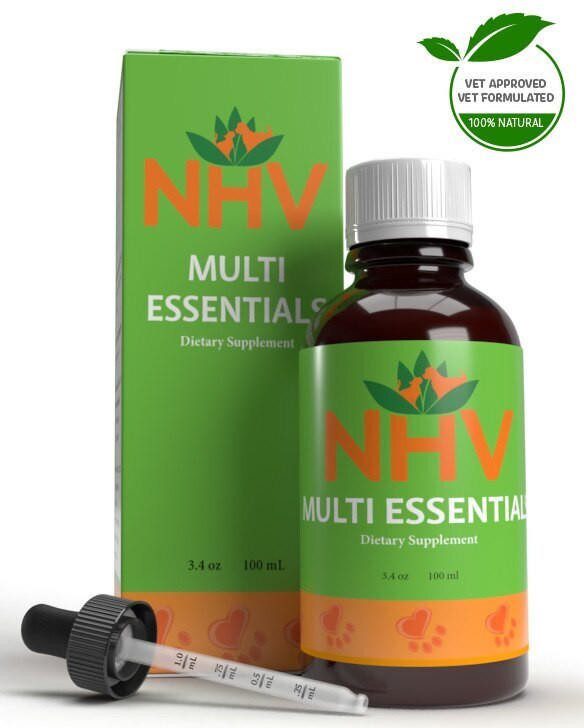
Herbal Digestive Aid, Energy Booster, and Multivitamin for Dogs
buy 2 and save $3
3 month supply for a small to medium size pet
NHV’s multivitamins for dogs targets the brain, stomach, major arteries, kidneys, and liver with a powerful blend of herbal support.

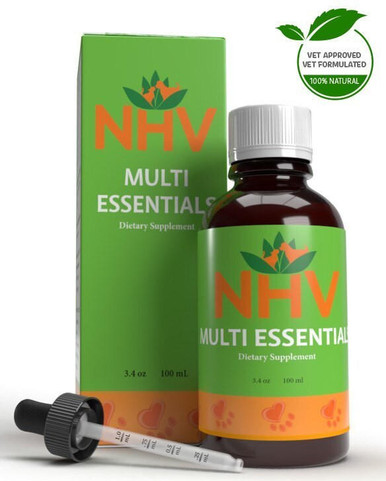
NHV’s multivitamins for dogs targets the brain, stomach, major arteries, kidneys, and liver with a powerful blend of herbal support.

Millions of people take multivitamins daily to support their health, and it only makes sense our canine companions can benefit just as much. This 100% natural plant-based liquid blend can help your dog with nutritional deficiencies.
Signs of Possible Vitamin Deficiency in Dogs
NHV’s Multi-Essentials are packed with herbs that are rich in vitamins and minerals. This vet-formulated blend is designed to benefit your dog’s health using all-natural organically grown herbs with no additives or preservatives.
Even if your pet is healthy, supplying a multivitamin is essential to maintain good health, and some pets need more vitamins and minerals than others. For more, read NHV’s blog, vet talk with Dr. Hillary Cook.
Benefits of NHV’s Multivitamins for Dogs
You can read NHV's blog about the importance of dog vitamin supplements. All pets can benefit from NHV’s Natural Pet Product, even small exotic pets.
If you have questions about plant-based supplements including our multivitamins for dogs, you can schedule a consultation with one of our highly trained holistic veterinarians, because, at NHV, total health and wellness for all pets is our top priority.
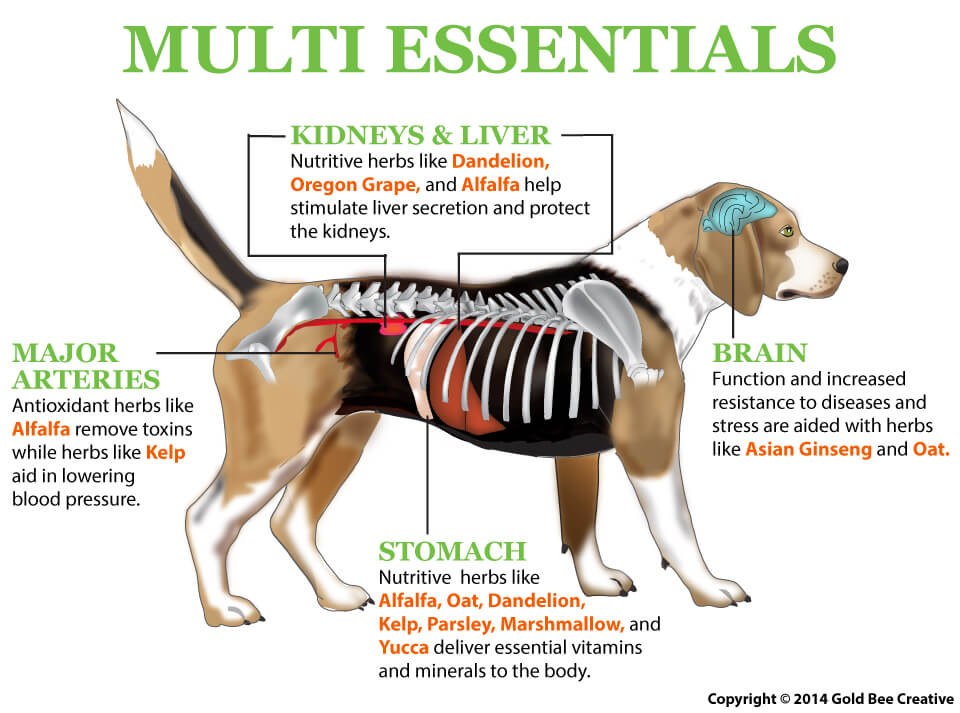
Select your pet's weight to determine the correct dose.
To be taken twice daily. Determine your pet’s weight and then use the easy chart below to determine the correct dose. This is the minimum dosage.
Pet's Weight Dosage
0 - 15 lb = 0.5 ml
16 - 30 lb = 1.0 ml
31 - 45 lb = 1.5 ml
46 - 60 lb = 2.0 ml
61 - 75 lb = 2.5 ml
Over 75 lb = 3.0 ml
How to Administer
Shake well before use. The easiest method is to use the dropper provide and places the drops into your pet’s food or favorite treat. You can also use the dropper and squirt directly into the pet’s mouth.
Some pets can be finicky, if this occurs consider hiding the drops in foods most pet’s love such as fish, chicken or yogurt or a favourite treat. If your pet only eats dry food then soak a few kibbles at feeding time.
For Best Results
Herbal dietary supplements are beneficial to the health and wellbeing of your pet and are safe for long-term use. Every pet responds to natural herbal supplements differently, therefore it is important to be consistent and administer the product daily. Supplements generally take two to four weeks to take effect, however this will vary from one animal to the next.
Product Storage
All NHV Natural Pet Products are pure herbal extracts and contain no artificial additives, preservatives or coloring. Shelf life after opening is 6 months and must be refrigerated after opening.
Cautions and Contraindications
Do not use Multi Essentials in pregnant or nursing animals. Speak to your vet before using our products. A second visit is recommended if your pet’s condition does not improve, or deteriorates after continued use of the supplements.
All information provided by NHV Natural Pet Products is for educational purposes only.
Millions of people take multivitamins daily to support their health, and it only makes sense our canine companions can benefit just as much. This 100% natural plant-based liquid blend can help your dog with nutritional deficiencies.
Signs of Possible Vitamin Deficiency in Dogs
NHV’s Multi-Essentials are packed with herbs that are rich in vitamins and minerals. This vet-formulated blend is designed to benefit your dog’s health using all-natural organically grown herbs with no additives or preservatives.
Even if your pet is healthy, supplying a multivitamin is essential to maintain good health, and some pets need more vitamins and minerals than others. For more, read NHV’s blog, vet talk with Dr. Hillary Cook.
Benefits of NHV’s Multivitamins for Dogs
You can read NHV's blog about the importance of dog vitamin supplements. All pets can benefit from NHV’s Natural Pet Product, even small exotic pets.
If you have questions about plant-based supplements including our multivitamins for dogs, you can schedule a consultation with one of our highly trained holistic veterinarians, because, at NHV, total health and wellness for all pets is our top priority.

Select your pet's weight to determine the correct dose.
To be taken twice daily. Determine your pet’s weight and then use the easy chart below to determine the correct dose. This is the minimum dosage.
Pet's Weight Dosage
0 - 15 lb = 0.5 ml
16 - 30 lb = 1.0 ml
31 - 45 lb = 1.5 ml
46 - 60 lb = 2.0 ml
61 - 75 lb = 2.5 ml
Over 75 lb = 3.0 ml
How to Administer
Shake well before use. The easiest method is to use the dropper provide and places the drops into your pet’s food or favorite treat. You can also use the dropper and squirt directly into the pet’s mouth.
Some pets can be finicky, if this occurs consider hiding the drops in foods most pet’s love such as fish, chicken or yogurt or a favourite treat. If your pet only eats dry food then soak a few kibbles at feeding time.
For Best Results
Herbal dietary supplements are beneficial to the health and wellbeing of your pet and are safe for long-term use. Every pet responds to natural herbal supplements differently, therefore it is important to be consistent and administer the product daily. Supplements generally take two to four weeks to take effect, however this will vary from one animal to the next.
Product Storage
All NHV Natural Pet Products are pure herbal extracts and contain no artificial additives, preservatives or coloring. Shelf life after opening is 6 months and must be refrigerated after opening.
Cautions and Contraindications
Do not use Multi Essentials in pregnant or nursing animals. Speak to your vet before using our products. A second visit is recommended if your pet’s condition does not improve, or deteriorates after continued use of the supplements.
All information provided by NHV Natural Pet Products is for educational purposes only.
constipation support
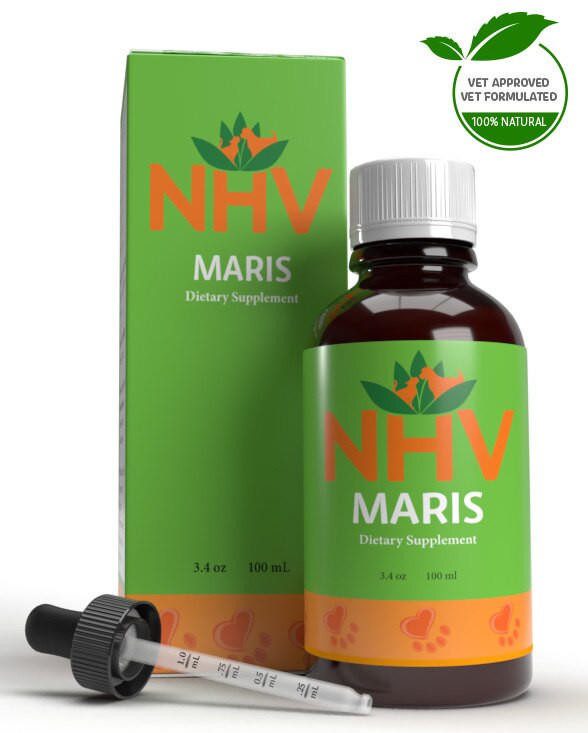
Holistic Canine Constipation Support
buy 2 and save $3
3 month supply for a small to medium size pet
Is your dog having difficulty pooping or there’s no poop at all? Maris is a natural dog constipation support that helps to promote regular bowel movements and softer stools. It may help relieve digestive congestion, inflammation and support healthy elimination.

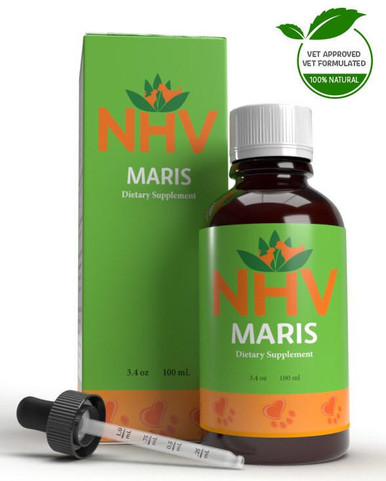
Is your dog having difficulty pooping or there’s no poop at all? Maris is a natural dog constipation support that helps to promote regular bowel movements and softer stools. It may help relieve digestive congestion, inflammation and support healthy elimination.

Natural Constipation Support for Dogs
Besides straining and painful or difficult defecation, if you realize your pup is showing signs like hard, dry small stools, lethargy, loss of appetite, hunched posture or vomiting for more than two days, you should consider taking them to see your trusted vet to run some tests to figure out the underlying cause. Your vet will be able to check the consistency of the stools through a physical examination and get an idea of how advanced the constipation is. Further exams like lab tests, endoscopy, and image exams like X-rays and ultrasounds might be required to rule out other conditions like tumors in the GI tract, for instance. Musculoskeletal disorders, neurological conditions, and diseases in the urinary tract also need to be ruled out since they can be the primary causes of constipation.
Constipation is a very serious symptom. It is important to keep in mind that chronic constipation can lead to more complicated issues like obstipation and megacolon. Obstipation happens when fecal matter becomes chronically compacted, and your furkiddo can't poop at all. Megacolon happens when the colon loses its normal motility and ability to eliminate waste normally. Obstipation and megacolon are complex health issues and may require manual or surgical removal by your trusted vet. The treatment for constipation will depend on the underlying cause, its severity and its duration.
For acute constipation or constipation that tends to recur, we'd suggest adding a natural dog constipation support remedy like NHV Maris to your pup’s daily meals. Maris’ gentle formulation means that you can safely increase the dosage on days that your pet needs the extra support. NHV Maris for dog constipation can safely be used short-term as well as long-term as natural health support. Maris promotes soft stools and may help improve colon health in puppies (vaccinated and weaned), as well as adult dogs.
How NHV’s Natural Dog Constipation Remedy Eases Constipation
Constipation can cause a lot of discomfort for your little one. Ingredients like Cascara Sagrada and Ginger can improve intestinal muscle tone, reduce muscle cramping during bowel movements and relieve nausea. The laxative properties in Maris create softer stool, which also makes bowel movements easier and reduces straining. Herbs like Dandelion promote healthy movement through the colon by stimulating bile flow while Marshmallow soothes and lubricates irritated digestive tissues.
Causes for Constipation in Dogs
There are many different causes for constipation such as:
Get Your Dog On The Road To Recovery With NHV Supplements
Part of being a pet parent is keeping your companion safe and comfortable. When it comes to natural dog constipation remedies, we only use the best ingredients to make a gentle yet effective formulation that is safe to use on all dogs. NHV Natural Pet Products are 100% natural, and their liquid formulations make them easy to hide in food. For any questions or concerns about your little one’s unique needs, contact us by live chat, email or phone with the button below.
Made with the finest, organically grown, or ethically harvested herbs. Made specifically for pets, vet-formulated and vet approved.
Select your pet's weight to determine the correct dose.
To be taken twice daily. Determine your pet’s weight and then use the easy chart below to determine the correct dose. This is the minimum dosage.
Pet's Weight Dosage
0 - 15 lb = 0.5 ml
16 - 30 lb = 1.0 ml
31 - 45 lb = 1.5 ml
46 - 60 lb = 2.0 ml
61 - 75 lb = 2.5 ml
Over 75 lb = 3.0 ml
How to Administer
Shake well before use. The easiest method is to use the dropper provide and place the drops into your pet’s food or favorite treat. You can also use the dropper and squirt directly into the pet’s mouth.
Some pets can be finicky, if this occurs consider hiding the drops in foods most pet’s love such as fish, chicken or yogurt or a favorite treat. If your pet only eats dry food then soak a few kibbles at feeding time.
For Best Results
Herbal dietary supplements are beneficial to the health and wellbeing of your pet and are safe for long-term use. Every pet responds to natural herbal supplements differently, therefore it is important to be consistent and administer the product daily. Supplements generally take two to four weeks to take effect, however this will vary from one animal to the next.
Product Storage
All NHV Natural Pet Products are pure herbal extracts and contain no artificial additives, preservatives or coloring. Shelf life after opening is 6 months and must be refrigerated after opening.
Cautions and Contraindications
Do not use Maris in pregnant or nursing animals. Do not use with intestinal obstructions. Speak to your vet before using our products. A second visit is recommended if your pet’s condition does not improve, or deteriorates after continued use of the supplements.
All information provided by NHV Natural Pet Products is for educational purposes only.
Natural Constipation Support for Dogs
Besides straining and painful or difficult defecation, if you realize your pup is showing signs like hard, dry small stools, lethargy, loss of appetite, hunched posture or vomiting for more than two days, you should consider taking them to see your trusted vet to run some tests to figure out the underlying cause. Your vet will be able to check the consistency of the stools through a physical examination and get an idea of how advanced the constipation is. Further exams like lab tests, endoscopy, and image exams like X-rays and ultrasounds might be required to rule out other conditions like tumors in the GI tract, for instance. Musculoskeletal disorders, neurological conditions, and diseases in the urinary tract also need to be ruled out since they can be the primary causes of constipation.
Constipation is a very serious symptom. It is important to keep in mind that chronic constipation can lead to more complicated issues like obstipation and megacolon. Obstipation happens when fecal matter becomes chronically compacted, and your furkiddo can't poop at all. Megacolon happens when the colon loses its normal motility and ability to eliminate waste normally. Obstipation and megacolon are complex health issues and may require manual or surgical removal by your trusted vet. The treatment for constipation will depend on the underlying cause, its severity and its duration.
For acute constipation or constipation that tends to recur, we'd suggest adding a natural dog constipation support remedy like NHV Maris to your pup’s daily meals. Maris’ gentle formulation means that you can safely increase the dosage on days that your pet needs the extra support. NHV Maris for dog constipation can safely be used short-term as well as long-term as natural health support. Maris promotes soft stools and may help improve colon health in puppies (vaccinated and weaned), as well as adult dogs.
How NHV’s Natural Dog Constipation Remedy Eases Constipation
Constipation can cause a lot of discomfort for your little one. Ingredients like Cascara Sagrada and Ginger can improve intestinal muscle tone, reduce muscle cramping during bowel movements and relieve nausea. The laxative properties in Maris create softer stool, which also makes bowel movements easier and reduces straining. Herbs like Dandelion promote healthy movement through the colon by stimulating bile flow while Marshmallow soothes and lubricates irritated digestive tissues.
Causes for Constipation in Dogs
There are many different causes for constipation such as:
Get Your Dog On The Road To Recovery With NHV Supplements
Part of being a pet parent is keeping your companion safe and comfortable. When it comes to natural dog constipation remedies, we only use the best ingredients to make a gentle yet effective formulation that is safe to use on all dogs. NHV Natural Pet Products are 100% natural, and their liquid formulations make them easy to hide in food. For any questions or concerns about your little one’s unique needs, contact us by live chat, email or phone with the button below.
Made with the finest, organically grown, or ethically harvested herbs. Made specifically for pets, vet-formulated and vet approved.
Select your pet's weight to determine the correct dose.
To be taken twice daily. Determine your pet’s weight and then use the easy chart below to determine the correct dose. This is the minimum dosage.
Pet's Weight Dosage
0 - 15 lb = 0.5 ml
16 - 30 lb = 1.0 ml
31 - 45 lb = 1.5 ml
46 - 60 lb = 2.0 ml
61 - 75 lb = 2.5 ml
Over 75 lb = 3.0 ml
How to Administer
Shake well before use. The easiest method is to use the dropper provide and place the drops into your pet’s food or favorite treat. You can also use the dropper and squirt directly into the pet’s mouth.
Some pets can be finicky, if this occurs consider hiding the drops in foods most pet’s love such as fish, chicken or yogurt or a favorite treat. If your pet only eats dry food then soak a few kibbles at feeding time.
For Best Results
Herbal dietary supplements are beneficial to the health and wellbeing of your pet and are safe for long-term use. Every pet responds to natural herbal supplements differently, therefore it is important to be consistent and administer the product daily. Supplements generally take two to four weeks to take effect, however this will vary from one animal to the next.
Product Storage
All NHV Natural Pet Products are pure herbal extracts and contain no artificial additives, preservatives or coloring. Shelf life after opening is 6 months and must be refrigerated after opening.
Cautions and Contraindications
Do not use Maris in pregnant or nursing animals. Do not use with intestinal obstructions. Speak to your vet before using our products. A second visit is recommended if your pet’s condition does not improve, or deteriorates after continued use of the supplements.
All information provided by NHV Natural Pet Products is for educational purposes only.
Published: July 7, 2017